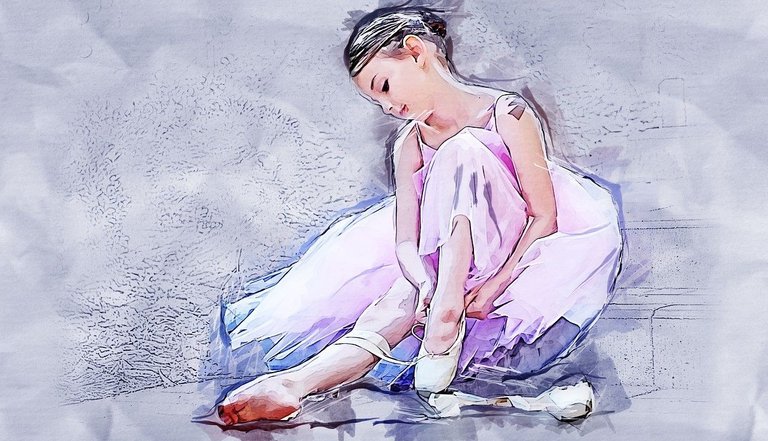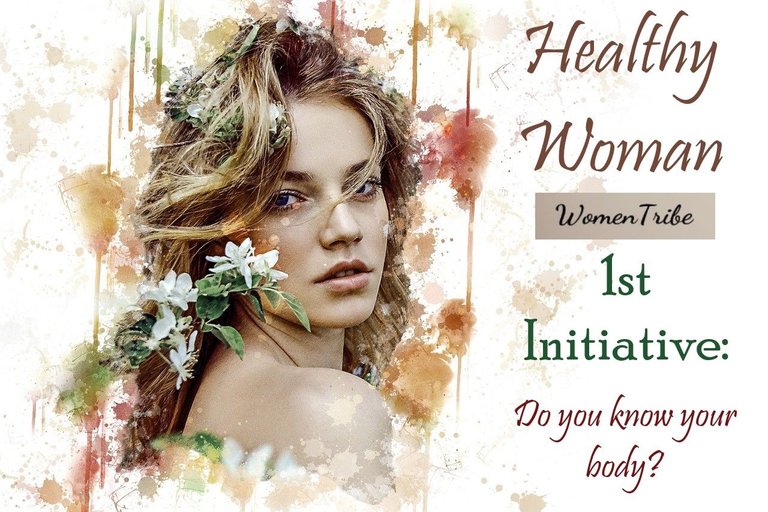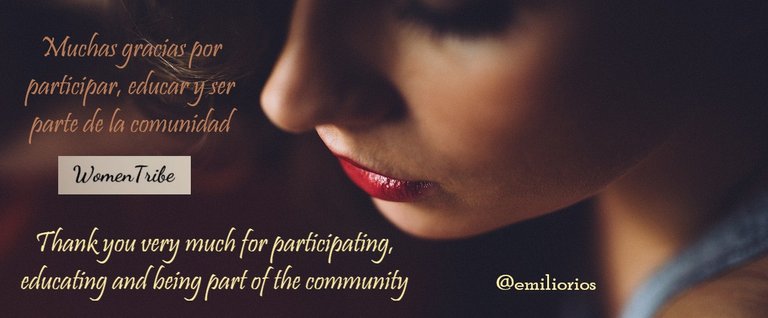Mujer Saludable. 1era Iniciativa: ¿Conoces tu cuerpo? -El ciclo menstrual como guía para el ejercicio físico- (ES/EN)


Debo agradecer la invitación que me han hecho las administradoras de @womentribe, especialmente a @nanyuris y a @parauri para estrenar una nueva columna que tiene como centro, la salud femenina:
Mujer Saludable
No es solo para la mujer; ya que, el hombre, como complemento de la mujer, también debe estar en capacidad de entenderla y de conocer sus alegrías y aflicciones.
Comenzamos con una iniciativa que tiene que ver con la capacidad de cuidarnos, y es el hecho de que primero debemos conocernos.
En la mujer, los ciclos hormonales ejercen cambios importantes que deben aprovecharse, no solo para respetar el cuerpo, sino para obtener el mayor beneficio posible y la eficiencia más elevada al realizar las actividades que ellas se proponen.
Queremos explorar, qué tanto te conoces, pero también, darte una guía de lo que es posible realizar según tu biología.


Mitos y verdades
La educación es necesaria e importante para fomentar el conocimiento del cuerpo de la mujer; eso nos ayuda a eliminar falsos conceptos y mitos que se han manejado en forma constante a nivel cultural.
Tiene mucho que ver con los orgasmos, por ejemplo; donde existen cientos de conceptualizaciones que no son ciertas, pues, estos son personalizados y cada mujer sabe qué siente y qué es capaz de sentir.
Pero también están otras leyendas urbanas, como, por ejemplo, que durante los procesos menstruales la mujer debe tomar cama y no puede entrenar; que su actividad física no alcanza niveles de eficiencia que en un hombre que no tiene un ciclo menstrual.
Algo completamente falso:
La mujer tiene un ciclo hormonal del cual puede hacer uso correctamente, para realizar sus actividades físicas en forma más eficiente y efectiva.
Conocernos y saber hasta dónde podemos llegar, para que nada entorpezca con nuestras funciones orgánicas, esta es la base de nuestra iniciativa.
Lograr que hagas una introspección y que nos respondas:

Base científica y médica de la iniciativa: El ejercicio físico y el ciclo menstrual
Me preocupó que, una amiga dejara de ir a entrenar porque no podía levantarse de la cama cada determinado tiempo en el mes, producto de sus problemas menstruales.
Le pregunté, pensando que pudiese necesitar ayuda médica, puesto que no es normal que en los tiempos de menstruación una mujer deba estar en cama; y su respuesta fue más cultural que otra cosa.
“No; debemos respetar esos días…”
Es por eso que me gustaría hablar sobre el ciclo hormonal en la mujer y las posibilidades de actividad física.
La mujer atraviesa por 4 fases a tomar en cuenta:
Una fase folicular, que dura del primer día de la menstruación anterior hasta 14 días después; donde los estrógenos están elevados aumentando sus niveles energéticos o de vitalidad.
Aquí hay secreción, además, de la hormona relaxina, que favorece la movilidad de las articulaciones.
Como dije, la energía está alta y el ejercicio físico puede darse con muy buena intensidad, aunque se sugiere que, por espacios cortos, no prolongados.
Luego hay una fase ovulatoria en el día 12 al día 16 del ciclo menstrual, aproximadamente, donde los estrógenos están en su máximo y la energía está disparada completamente.
Aquí se puede hacer ejercicios de peso y cardiovascular más prolongados y con más intensidad.
Luego, está la fase lútea, que va de los 14 a los 20 días; y es una fase en la cual la mujer disminuye notablemente sus estrógenos, donde hay retención de líquidos y donde se inicia el síndrome premenstrual con todos los malestares que esto trae como consecuencia.
La energía disminuye y el rendimiento también; así que, aquí hay que bajar la intensidad, las repeticiones y la prolongación del ejercicio.
Por último, está el momento de la menstruación, donde la mujer lo que necesita es descanso.
Aquí el ejercicio no debe paralizarse, pero puede simplemente transformarse en caminatas y en algún ejercicio aeróbico, si se lo permite su organismo.
Lo que más nos impresiona, es la capacidad que tiene la mujer de que, al conocerse, pueda compaginar sus actividades con lo que le va dictando su cuerpo.

¿Qué tanto te conoces?
En esta iniciativa, nos gustaría que nos respondieras el corto cuestionario anteriormente planteado.
Si eres hombre quien está leyendo esto -que tenemos muchos usuarios masculinos, excelentes y constantes aquí-, que puedas realizárselo a tu pareja, con la finalidad de que entendamos si nos conocemos o no.
Otra cosa muy importante:
Si hay anécdotas sobre esto que nos puedas compartir, como mujer o como hombre-pareja, que a veces no entiende los cambios, también nos será de mucha ayuda para conocernos, aprender los unos de los otros, y hacernos de herramientas que, de seguro, nos ayudarán a mejorar la interacción familiar y conyugal.
Publica en esta comunidad, invita a dos o tres usuarios a magnificar el tema y a participar; y comparte esta publicación, pues esperamos la tuya.
Recuerda, colocar tu participación en los comentarios de este artículo, pues solo así podemos valorarla, ya que dejamos libre la elección de etiquetas que uses.
Y mil gracias por hacer comunidad seria y educativa en #Hive


Healthy Woman. 1st Initiative: Do you know your body? -The menstrual cycle as a guide for physical exercise-


I must thank the @womentribe administrators for inviting me, especially @nanyuris and @parauri to debut a new column with women's health at its core:
Healthy Women
It is not only for women, since men, as a complement to women, must also be able to understand them and know their joys and sorrows.
We begin with an initiative that has to do with the ability to take care of ourselves, and that is the fact that we must first know ourselves.
In women, hormonal cycles exert important changes that must be taken advantage of, not only to respect the body, but also to obtain the greatest possible benefit and the highest efficiency in carrying out the activities that they propose.
We want to explore how well you know yourself, but also to give you a guide to what is possible according to your biology.


Myths and truths
Education is necessary and important to promote the knowledge of the woman's body; this helps us to eliminate false concepts and myths that have been handled constantly at a cultural level.
It has a lot to do with orgasms, for example; where there are hundreds of conceptualizations that are not true, because they are personalized and each woman knows what she feels and what she is capable of feeling.
But there are also other urban legends, such as, for example, that during menstrual processes women must take bed and cannot train; that their physical activity does not reach levels of efficiency that in a man who does not have a menstrual cycle.
Something completely false:
Women have a hormonal cycle which they can make use of correctly, to perform their physical activities more efficiently and effectively.
Knowing ourselves and knowing how far we can go, so that nothing interferes with our organic functions, this is the basis of our initiative.
To get you to make an introspection and to answer us:

Scientific and medical basis for the initiative: Physical exercise and the menstrual cycle
I was concerned that a friend of mine stopped training because she could not get out of bed every few months due to her menstrual problems.
I asked her, thinking that she might need medical help, since it is not normal for a woman to be in bed during menstruation, and her answer was more cultural than anything else.
"No; we must respect those days..."
That is why I would like to talk about the hormonal cycle in women and the possibilities of physical activity.
The woman goes through 4 phases to take into account:
A follicular phase, which lasts from the first day of the previous menstruation until 14 days later; where estrogens are elevated increasing their energy or vitality levels.
Here there is also secretion of the hormone relaxin, which promotes joint mobility.
As I said, energy is high and physical exercise can be done with very good intensity, although it is suggested that, for short periods of time, not prolonged.
Then there is an ovulatory phase on day 12 to day 16 of the menstrual cycle, approximately, where estrogens are at their peak and energy is completely shot.
Here you can do longer and more intense weight and cardiovascular exercises.
Then, there is the luteal phase, which goes from 14 to 20 days; and it is a phase in which the woman notably decreases her estrogens, where there is fluid retention and where the premenstrual syndrome begins with all the discomforts that this brings as a consequence.
Energy decreases and so does performance; so, here it is necessary to lower the intensity, repetitions and prolongation of the exercise.
Finally, there is the time of menstruation, where the woman needs rest.
Here the exercise should not be stopped, but can simply be transformed into walks and some aerobic exercise, if your body allows it.
What impresses us most is the ability of women to combine their activities with what their body dictates.

How well do you know yourself?
In this initiative, we would like you to answer the short questionnaire above.
If you are a man reading this -we have many excellent and constant male users here-, we would like you to ask your partner, so that we can understand if we know each other or not.
Another very important thing:
If there are anecdotes about this that you can share with us, as a woman or as a man-partner, who sometimes does not understand the changes, it will also be very helpful for us to know each other, learn from each other, and get tools that, for sure, will help us to improve family and marital interaction.
Post in this community, invite two or three users to magnify the topic and participate; and share this publication, as we are waiting for yours.
Remember, place your participation in the comments of this article, as this is the only way we can value it, since we leave free the choice of tags you use.
And thank you for making a serious and educational community in #Hive.

Emilio Ríos – Venezuela
@emiliorios


- Barras separadoras y logo de English, editadas en Paint, de:
Separator bars and English logo edited in Paint, from:
Pixabay-JillWellington
Cintillo personalizado de @emiliorios con el logo de #Hive, realizado por la excelente creadora @mosa71
Custom @emiliorios headband with the #Hive logo, made by the excellent creator @mosa71Nuevo logo de Twitter tomado de la plataforma de la red social.
New Twitter logo taken from the social network platform.Imagen de agradecimiento, tomando el logo de nuestra comunidad y editado en Paint, de:
Thank you image, taking our community logo and edited in Paint, by:
Pixabay-Pexels
- Si lo deseas, puedes seguirnos en:
If you wish, you can follow us at:




Que buen tema has escogido para desarrollar esta primera iniciativa... Éxitos
Muchas gracias Lorennys @lorennys
Espero que obtengamos muchas lecciones de vida y que nos conozcamos más.
Empezamos con salud que es un excelente nicho.
Amigo y doctor @emiliorios. Bienvenido como columnista a Womentribe, en hora buena hora llegas para formar parte del equipo. Arrancas con un buen tema en tu columna "Mujer Saludable" , hasta el nombre me encanta. Con mucha razón planteas y motivas a la participación sobre este tema, porque ciertamente es bueno hacernos y respondernos las preguntas que planteas, pues conocer nuestro cuerpo es entenderlo también.
Mi abrazo amigo y de nuevo bienvenido 🙏💙
Muchas gracias por el estímulo y los buenos deseos para la columna.
Un abrazo inmenso @parauri
Bienvenidas las Delegaciones / Welcome Delegations
Trail de Curación / Curation Trail
Gracias, equipo de @mundo.autismo
Hola. Me gusta mucho esta nueva columna. Debo confesar que no soy de hacer mucho ejercicio y menos de conocer mi cuerpo de la manera que lo mencionas. Y de verdad debe de ser justo y necesario comprender nuestro cuerpo. Un placer leer y aprender. Saludos
Gracias Aime, @derzweile ojalá te animes y nos des un artículo con tus experiencias.
Has sido curado por @visualblock / You've been curated by @visualblock
Bienvenidas delegaciones / Delegations welcome
Trail de Curación / Curation Trail
Vota por nuestro Testigo aliado - @hispapro / Vote for our allied Witness - @hispapro
Más información sobre el testigo aquí / More information about the witness here
Muchas gracias por el apoyo equipo de @visualblock
A ti por todo lo que nos enseñas y nos haces reflexionar. 🤗
buenas doc,espero poder aportar mi granito a este gran tema porque muchas ocasiones no conocemos nuestro cuerpos y sus señales
Muchas gracias @zorili91
Yo no suelo suspender el ejercicio cuando tengo mi periodo. De hecho, yo llevo algunos indicadores que me hacen sentir que puedo dar el máximo en todo. Otros en los que no quiero, pero igual hago el ejercicio, pero no bajo la intensidad, bajo las repeticiones.
¡Perfecto! Aquí hay conocimiento del cuerpo.
¿Será que esperamos tu publicación con tus experiencias al respecto?
Muchas gracias @yeceniacarolina
@tipu curate 8
Upvoted 👌 (Mana: 0/75) Liquid rewards.
Muchas gracias @miriannalis y al equipo de @tipu por el apoyo.
https://ecency.com/hive-139925/@zorili91/eseniniciativa-mujer-saludable-cuando-tu-cuerpo-habla
Muchísimas gracias @zorili91
gracias a usted por los temas tan importantes que nos hace pensar y repensar en nuestras vidas,como la estamos tratando
https://peakd.com/hive-139925/@albesalazar/iniciativa-mujer-saludable--conoces-tu-cuerpo-esp-eng participando en esta gran iniciativa. Saludos